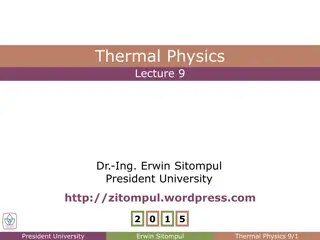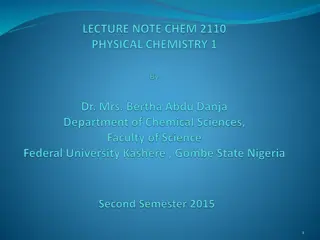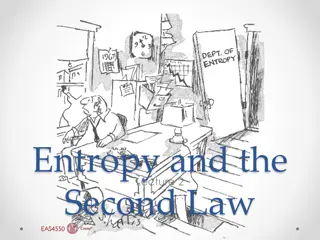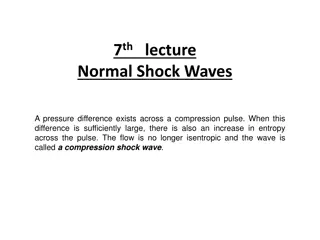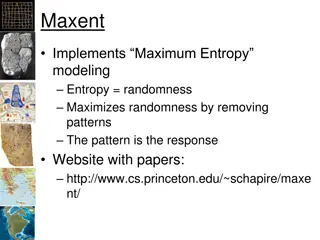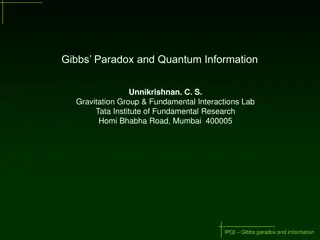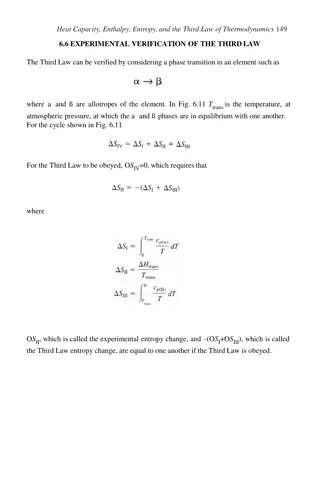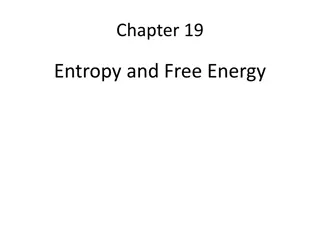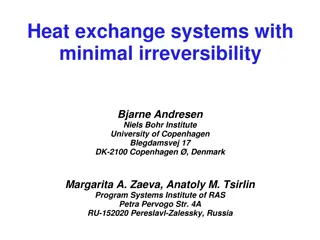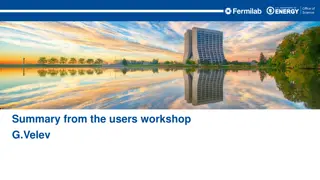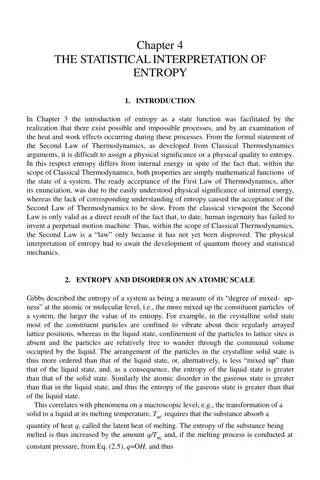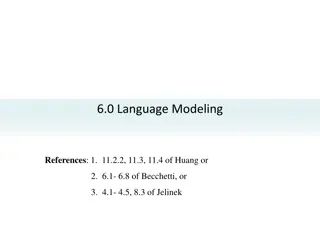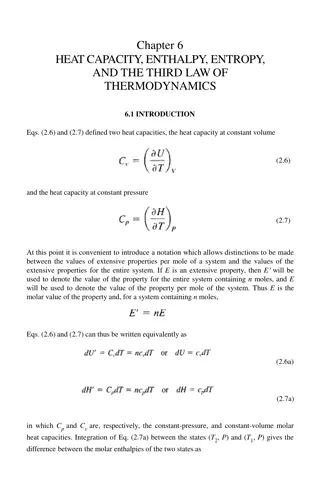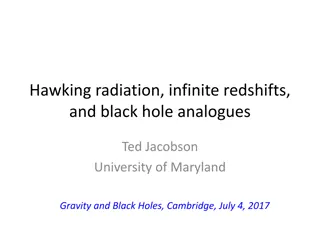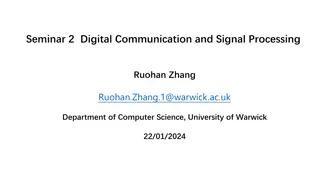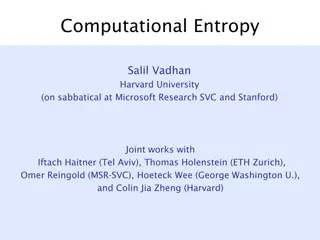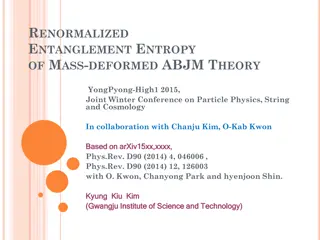Entropy in British Victorian Literature: A Scientific Analysis
Delve into the entropic nature of British Victorian Literature as Hannah Harris explores the concept of entropy in storytelling. Uncover how the lack of a defined center and the compulsion to repeat shape these works, validated by science as faithful reflections of life through realism.
9 views • 22 slides
The Carnot Engine: Application of the Second Law of Thermodynamics
Exploring the Carnot engine as an ideal model to understand the Second Law of Thermodynamics, which highlights the efficiency of heat engines and the concept of entropy. The engine operates through a cyclic process, transferring heat from a high-temperature reservoir to a low-temperature one, produc
0 views • 15 slides
Kinetic Theory of Gases and Thermodynamics
Explore the fundamental principles of the kinetic theory of gases, including the five postulates and the relationship between macroscopic properties and microscopic phenomena. Delve into the concept of entropy and thermodynamics, along with the behavior of ideal and real gases. Gain insights into th
2 views • 116 slides
Development of High Entropy Alloy-Based SOFC Anode for Controlled Reformation
Development and testing of a High Entropy Alloy-based Solid Oxide Fuel Cell (SOFC) anode for controlled reformation to improve thermal performance, reduce carbon deposition, and enhance durability. The project involves fabricating cells, electrochemical testing, modeling reformation rates, and scali
1 views • 32 slides
Entropy and the Second Law of Thermodynamics
This lecture delves into the concepts of entropy and the Second Law of Thermodynamics. It discusses the intuitive sense of energy, the nature of entropy, and the irreversibility of processes. The Second Law is highlighted in relation to heat transfer, work, and the increase of entropy in the univers
5 views • 23 slides
Information Entropy in Information Theory
Information entropy, a key concept in information theory, measures the average amount of information in a message. Source entropy and binary source entropy are explained with examples, along with maximum source entropy for both binary and non-binary sources. Learn how to calculate entropy for differ
3 views • 12 slides
Normal Shock Waves in Gas Dynamics
In gas dynamics, normal shock waves occur when there is a significant pressure difference across a compression pulse, leading to increased entropy. This results in non-isentropic flow known as compression shock waves. The formation of compression and expansion waves can be likened to piston movement
3 views • 16 slides
Maximum Entropy Modeling in Environmental Science
Maximum Entropy modeling, also known as MaxEnt, is a technique that maximizes randomness by removing patterns in data. This method is widely used in environmental science to create models using covariates, occurrences, and probability density functions. The relationships between histograms and proba
3 views • 46 slides
Gibbs Paradox and Quantum Information: Understanding Entropy and Resolution
Description of the Gibbs problem of entropy mixing gases, conventional resolution, issues of (dis)continuity, the role of indistinguishability and quantum mechanics in resolution, dissenting views, necessity of quantum mechanics, and the relationship between statistical mechanics and entropy. Key di
3 views • 19 slides
Thermodynamics of Materials: Experimental Verification and Entropy Analysis
Verification of the Third Law of Thermodynamics through the study of phase transitions in elements like sulfur, exemplifying the relationship between heat capacity, enthalpy, entropy, and the Third Law. Experimental data on entropy changes and molar entropies, as well as insights into the behavior o
2 views • 24 slides
Biochemistry
Bioenergetics is the quantitative study of energy transformations in living cells, governed by the laws of thermodynamics. Living systems constantly exchange energy and matter with their surroundings to maintain order while operating within the principles of energy conservation and increasing entrop
1 views • 23 slides
Thermodynamics: Spontaneity, Entropy, and Free Energy
Definitions of spontaneous processes, entropy, enthalpy, and free energy in thermodynamics. Exploring the laws of thermodynamics, entropy changes in chemical reactions, and Gibbs free energy. Understand factors affecting entropy increase and calculations involved.
14 views • 9 slides
Data Analysis and Prediction with Machine Learning
This project focuses on analyzing data relating to passengers on the Titanic and predicting survival outcomes using Python programming. Leveraging libraries like Pandas, NumPy, and SKLearn, the goal is to create a prediction system by understanding machine learning algorithms such as decision trees
3 views • 14 slides
Optimizing Heat Exchange Systems with Minimal Irreversibility
In the field of finite-time thermodynamics, minimizing entropy production in heat exchange systems is crucial to reduce exergy loss. Tsirlin's approach focuses on finding the least lossy design by optimizing heat conductance, capacity rates, and heat load while considering various streams and phase
4 views • 12 slides
Entropy in Thermodynamics
Entropy is a crucial concept in thermodynamics, defining the direction of processes. It quantifies the 2nd Law and reveals how systems evolve towards increasing disorder. This chapter delves into Clausius Inequality, entropy change, extensive and intensive properties of entropy, and T-ds relations i
2 views • 10 slides
Statistical Interpretation of Entropy - Introduction and Atomic Scale Disorder
In Chapter 4, the concept of entropy as a state function is explored further, focusing on its physical significance and relation to disorder at the atomic level. Entropy in different states of matter is discussed, highlighting the correlation between disorder and entropy changes during phase transit
0 views • 20 slides
Loss Functions in Neural Networks
Loss functions play a crucial role in neural network training, quantifying the error between predicted and actual values. Explore how entropy and information theory relate to the unpredictability of data, leading to deep dives into Mean Squared Error and Binary Cross Entropy loss functions.
4 views • 9 slides
Language Modeling: Providing Linguistic Constraints for Text Generation
Language modeling involves utilizing linguistic constraints to assist in selecting the correct words for generating text. This process is essential for various applications such as speech recognition and natural language processing. It entails analyzing probabilities of word sequences based on lingu
0 views • 27 slides
Topological Phase Transitions Seminar
This seminar on topological phase transitions, presented by Melda Akyazi, covers topics like XY model, spin wave approximation, vortices, experimental realization, and more. It discusses N-Vector models, Ising model, XY model, Heisenberg model, and the characterisation of phase transitions based on
1 views • 40 slides
Advanced Information Theory and Channel Coding Concepts
Explore differential entropy, mutual information, channel capacity, and more in the field of Information Theory and Coding. Learn about maximizing entropy in practical systems and capacity of band-limited channels with AWGN. Dive into the intricacies of channel coding theorem and related topics.
0 views • 20 slides
Heat Capacity, Enthalpy, Entropy, and Third Law of Thermodynamics
Explore the concepts of heat capacity, enthalpy, and entropy in the context of thermodynamics, including the molar values of properties, theoretical calculations of heat capacity, and the impact of temperature on energy levels. Learn about the Third Law of Thermodynamics and the relationships betwee
2 views • 24 slides
Exploring Hawking Radiation and Black Hole Thermodynamics
Delve into the fascinating world of Hawking radiation, black hole entropy, and the profound implications for thermodynamics. Discover how Stephen Hawking's groundbreaking work revolutionized our understanding of black holes and quantum field theory, leading to insights on infinite redshifts and even
2 views • 27 slides
Information Theory: Entropy Calculation and Source Encoding
Dive into the world of information theory with a focus on calculating entropy and exploring source encoding techniques. Learn how to determine the average amount of information in messages, compute binary source entropy, and analyze maximum source entropy for both binary and non-binary sources.
2 views • 12 slides
Digital Communication & Signal Processing Seminar Insights
Explore the world of digital communication and signal processing through probabilistic models, entropy calculations, Huffman coding, and compression ratios. Delve into the analysis of English text, source probabilities, instantaneously parsable codes, and more. Gain valuable knowledge on information
0 views • 15 slides
Computational Entropy and Cryptography Innovations
Explore the groundbreaking work on computational entropy and complexity-based cryptography by leading researchers from Harvard University, Microsoft Research SVC, Tel Aviv University, ETH Zurich, and more. Discover how these concepts are revolutionizing digital security protocols and applications, s
0 views • 27 slides
Entanglement Entropy in Mass-Deformed ABJM Theory - Insights and Applications
Explore the renormalized entanglement entropy of mass-deformed ABJM theory, delving into holographic entanglement entropy, C-theorems, and computations through holographic entanglement entropy. Gain valuable insights from joint winter conferences on particle physics, string theory, and cosmology. Un
0 views • 40 slides
Entropy and Quantum Mechanics: Insightful Analysis
Delve into the relationship between entropy and quantum mechanics, where quantum states and probabilities offer a clearer interpretation of entropy. Explore concepts like Maxwell's Demon and the subjectivity of entropy definitions, unveiling the intriguing interplay between classical and quantum per
0 views • 25 slides
Entropy-Based Two-Phase Optimization Algorithm for Wordle-like Games
Learn about the Entropy-Based Two-Phase Optimization Algorithm (EBTPOA) designed to solve Wordle-like games efficiently with optimal results and improved time complexity. Explore the algorithm's performance in hitting answers with fewer guesses and enhancing efficiency in gameplay.
3 views • 16 slides
Entropy and the Second Law of Thermodynamics
The concept of entropy and the Second Law of Thermodynamics are fundamental principles in thermodynamics. Entropy is a measure of disorder or randomness in a system, with entropy production being a result of irreversibilities. The Second Law of Thermodynamics states that entropy in a closed system t
0 views • 18 slides
Chapter 17 Exam 2 Review: Spontaneous Processes, Entropy, and Gibbs Free Energy
Prepare for Exam 2 by reviewing key topics including spontaneous processes, entropy, and Gibbs free energy in Chapter 17. Understand concepts, predict changes, and calculate values essential for thermodynamics. Get ready for the exam with detailed insights provided in this review.
1 views • 14 slides
Statistical Ensembles and Maximum Entropy Principle
Learn about statistical ensembles, the maximum entropy principle, and their applications in thermodynamics. Discover how to calculate thermodynamic quantities and probabilities using microstates and statistical averages based on the Principle of Maximum Entropy. Explore key concepts such as entropy,
2 views • 5 slides
Efficient Entropy Accumulation and Random Number Generation Research
Explore the super-efficient entropy accumulation methods and random number generation infrastructure in the context of Win10. Delve into the modeling of entropic inputs, questioning the efficacy of rotation, and analyzing the results obtained. Discover which rotation numbers prove effective in accum
4 views • 25 slides
Entropy Changes in Simple Processes
Explore the concept of entropy changes in various simple processes such as phase changes, reversible isothermal volume change, irreversible isothermal volume change, and more in thermodynamics. Learn about the spontaneous nature of gas expansion, mixing of gaseous samples, and the relationship betwe
1 views • 103 slides
Automatic Key Term Extraction Using Branching Entropy - NTU Study
Discover the innovative approach by National Taiwan University for automatic key term extraction from spoken course lectures through branching entropy and prosodic/semantic features. Explore the proposed methodology, learning methods, experiments, and evaluation conducted to enhance key term extract
5 views • 51 slides
Understanding Entropy in Atmospheric Thermodynamics
Explore the concept of entropy in ideal gases through a detailed lecture covering topics such as entropy change, Gibbs theorem, and special cases of isothermal, isobaric, and isochoric transformations. Gain insights into the relationship between entropy and different thermodynamic processes.
3 views • 11 slides
Entropy in Thermodynamics
In thermodynamics, entropy plays a crucial role in understanding the behavior of systems. Starting from Caratheodory's statement, this content delves into the concept of entropy, its expression as a function of other properties in reversible adiabatic processes, and the integration factor involved.
0 views • 5 slides
Limit of Quantum Mechanics: Classical Mechanics in High Entropy
Discover how classical mechanics emerges as a high-entropy limit of quantum mechanics. Explore the fundamental differences and the potential of recovering classical mechanics from the high-entropy state in this intriguing study by Carcassi, Landini, and Aidala.
2 views • 13 slides
Understanding Entropy and Energy Flow in Systems
Explore the concept of entropy and its role in energy systems, as explained by Dr. Keith R. Skene from the Biosphere Research Institute. Learn how energy flow and complexity drive entropy production, influencing ecological processes such as succession.
2 views • 32 slides
Dimension Reduction Based on Entropy Bounds
Explore dimension reduction techniques in L1 space using entropy-based bounds, including the Johnson-Lindenstrauss lemma and lower bounds on distortion. Our results provide a simple proof leveraging information theory concepts. Dive into the world of entropy, mutual information, and Fano's inequalit
0 views • 19 slides
Cryptology Fundamentals: Security Theorems & Cipher Analysis
Explore the fundamentals of cryptology security theorems, including Shannon's security theorem, clear text redundancy, key entropy, and information entropy. Dive into cipher analysis problems, calculation of cryptogram bits, unicity distance, data rate changes, key length computations, and system se
0 views • 7 slides

